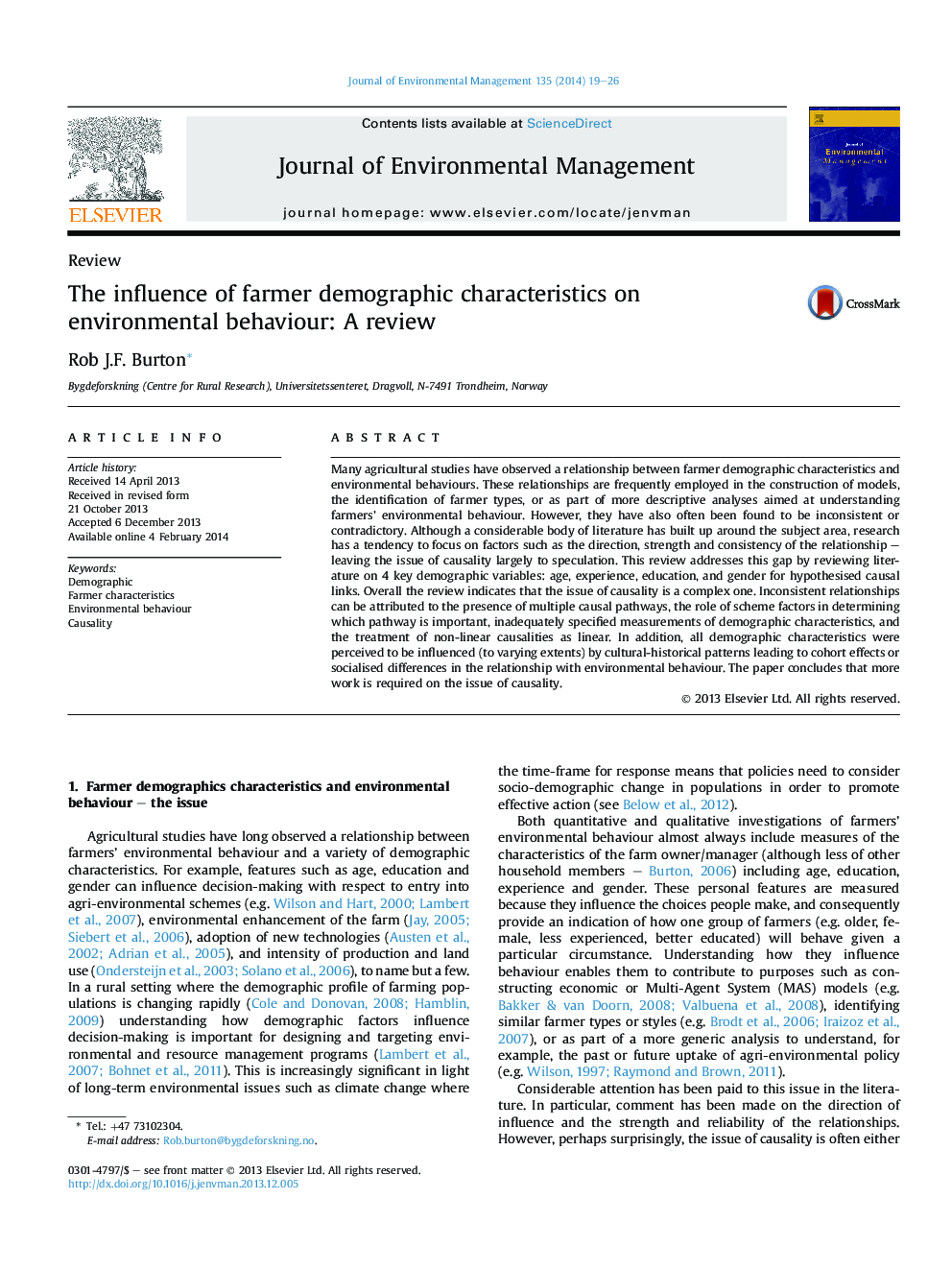| کد مقاله | کد نشریه | سال انتشار | مقاله انگلیسی | نسخه تمام متن |
|---|---|---|---|---|
| 7483986 | 1485277 | 2014 | 8 صفحه PDF | دانلود رایگان |
عنوان انگلیسی مقاله ISI
The influence of farmer demographic characteristics on environmental behaviour: A review
ترجمه فارسی عنوان
تأثیر ویژگی های جمعیت شناختی کشاورزان بر رفتار زیست محیطی: بررسی
دانلود مقاله + سفارش ترجمه
دانلود مقاله ISI انگلیسی
رایگان برای ایرانیان
کلمات کلیدی
دموکراتیک، خصوصیات کشاورزان، رفتار محیطی، علیت،
ترجمه چکیده
بسیاری از مطالعات کشاورزی ارتباط بین ویژگی های جمعیت شناختی کشاورزان و رفتارهای محیطی را مشاهده کرده اند. این روابط اغلب در ساخت مدل ها، شناسایی انواع کشاورزان و یا به عنوان بخشی از تحلیل های توصیفی بیشتر با هدف درک رفتار محیط زیست کشاورزان به کار گرفته می شود. با این حال، آنها نیز اغلب یافت می شود متناقض یا متناقض است. اگر چه بخش قابل توجهی از ادبیات در حوزه موضوعی ساخته شده است، اما تحقیقات تمایل به تمرکز بر روی عوامل مانند جهت، قدرت و انسجام روابط دارد - مسئله علیت به طور عمده به حدس و گمان افتادن است. این بررسی با بررسی ادبیات مربوط به 4 متغیر جمعیت شناختی، سن، تجربه، تحصیلات و جنسیت برای ارتباطات علمی فرض شده، این شکاف را بررسی می کند. در مجموع بررسی نشان می دهد که موضوع علیت یک پیچیده است. روابط غیرمستقیم می تواند به وجود چندین مسیر علیت مرتبط باشد، نقش عوامل طرح در تعیین مسیر، مهم است، اندازه گیری های نامناسب مشخص از مشخصات دموگرافیک، و درمان اقلام غیر خطی به عنوان خطی. علاوه بر این، تمامی خصوصیات جمعیت شناختی بر اساس الگوهای فرهنگی-تاریخی که منجر به اثرات همجنسگرایی یا تفاوت های اجتماعی در رابطه با رفتار محیطی می شود، تحت تاثیر قرار می گیرند (به تنهایی). این مقاله نتیجه گیری می کند که در مورد مسئله علیت بیشتر کار لازم است.
موضوعات مرتبط
مهندسی و علوم پایه
مهندسی انرژی
انرژی های تجدید پذیر، توسعه پایدار و محیط زیست
چکیده انگلیسی
Many agricultural studies have observed a relationship between farmer demographic characteristics and environmental behaviours. These relationships are frequently employed in the construction of models, the identification of farmer types, or as part of more descriptive analyses aimed at understanding farmers' environmental behaviour. However, they have also often been found to be inconsistent or contradictory. Although a considerable body of literature has built up around the subject area, research has a tendency to focus on factors such as the direction, strength and consistency of the relationship - leaving the issue of causality largely to speculation. This review addresses this gap by reviewing literature on 4 key demographic variables: age, experience, education, and gender for hypothesised causal links. Overall the review indicates that the issue of causality is a complex one. Inconsistent relationships can be attributed to the presence of multiple causal pathways, the role of scheme factors in determining which pathway is important, inadequately specified measurements of demographic characteristics, and the treatment of non-linear causalities as linear. In addition, all demographic characteristics were perceived to be influenced (to varying extents) by cultural-historical patterns leading to cohort effects or socialised differences in the relationship with environmental behaviour. The paper concludes that more work is required on the issue of causality.
ناشر
Database: Elsevier - ScienceDirect (ساینس دایرکت)
Journal: Journal of Environmental Management - Volume 135, 15 March 2014, Pages 19-26
Journal: Journal of Environmental Management - Volume 135, 15 March 2014, Pages 19-26
نویسندگان
Rob J.F. Burton,
